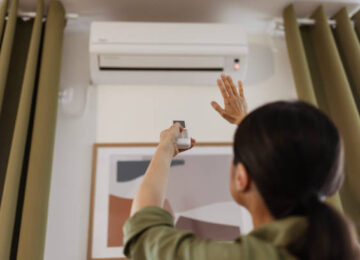Introduction to Heat Pumps
Heat pumps are a highly efficient, cost-effective way to heat and cool your home. They use electricity to transfer heat from one area to another, resulting in a comfortable indoor temperature year-round. Heat pumps are an alternative to traditional HVAC systems, and they offer many benefits, including lower energy bills, fewer emissions, and improved indoor air quality. In this guide, we’ll explain how heat pumps work and the different types of heat pumps available. We’ll also discuss the pros and cons of heat pumps, so you can decide if they are right for your home.
How Do Heat Pumps Work?
Heat pumps use electricity to transfer heat from one area to another. In the summer, a heat pump will move heat from your home to the outside. This keeps your home cool and comfortable. In the winter, a heat pump will move heat from outside to inside. This keeps your home warm and cozy. Heat pumps are highly efficient and can provide up to four times the amount of heat for every unit of energy used.
Types of Heat Pumps
There are several types of heat pumps available, each suited to different needs and climates.
Air Source Heat Pumps
Air source heat pumps are the most common type of heat pump and can be used in virtually any climate. They draw heat from the air outside and transfer it to your home. Air source heat pumps are usually the most affordable option and can be used for both heating and cooling.
Geothermal Heat Pumps
Geothermal heat pumps draw heat from the ground and transfer it to your home. They are more efficient than air source heat pumps and can be used in any climate. They are more expensive to install, but they can provide significant energy savings in the long run.
Hybrid Heat Pumps
Hybrid heat pumps combine air source and geothermal heat pumps to provide optimal efficiency. They are more expensive than other types of heat pumps but can provide significant energy savings in the long run.
Pros and Cons of Heat Pumps
Heat pumps offer many benefits, but there are some drawbacks as well. Here are some of the pros and cons of heat pumps:
Pros
- Highly efficient
- Cost-effective
- Lower energy bills
- Fewer emissions
- Improved indoor air quality
Cons
- More expensive to install
- Can be noisy
- Not suitable for very cold climates
FAQs About Heat Pumps
Are heat pumps efficient?
Yes, heat pumps are highly efficient. They can provide up to four times the amount of heat for every unit of energy used.
Do heat pumps require a lot of maintenance?
No, heat pumps require very little maintenance. They should be inspected annually by a qualified HVAC technician to ensure they are running efficiently.
Can you install a heat pump yourself?
No, heat pumps should be installed by a qualified HVAC technician.
Are heat pumps expensive to run?
No, heat pumps can be cost-effective to run. They can provide significant energy savings in the long run.
Conclusion
Heat pumps are a highly efficient, cost-effective way to heat and cool your home. They use electricity to transfer heat from one area to another, resulting in a comfortable indoor temperature year-round. Heat pumps are an alternative to traditional HVAC systems, and they offer many benefits, including lower energy bills, fewer emissions, and improved indoor air quality. There are several types of heat pumps available, each suited to different needs and climates. Heat pumps offer many benefits, but there are some drawbacks as well. Ultimately, heat pumps can be a great choice for many homes, but it’s important to weigh the pros and cons before making a decision.




Leave a Reply